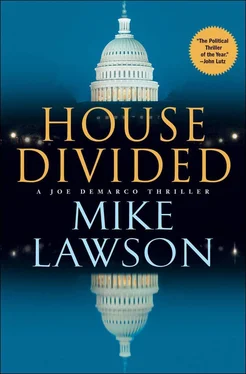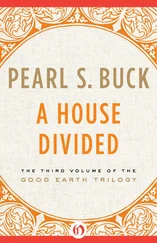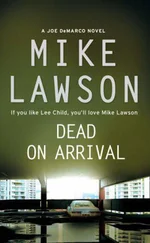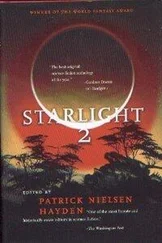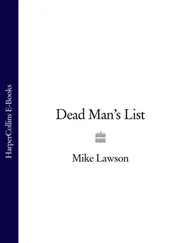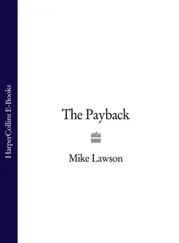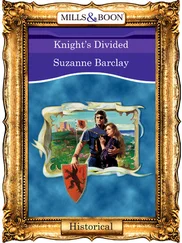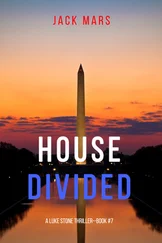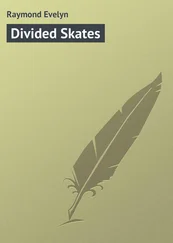Mike Lawson - House Divided
Здесь есть возможность читать онлайн «Mike Lawson - House Divided» весь текст электронной книги совершенно бесплатно (целиком полную версию без сокращений). В некоторых случаях можно слушать аудио, скачать через торрент в формате fb2 и присутствует краткое содержание. Жанр: Триллер, на английском языке. Описание произведения, (предисловие) а так же отзывы посетителей доступны на портале библиотеки ЛибКат.
- Название:House Divided
- Автор:
- Жанр:
- Год:неизвестен
- ISBN:нет данных
- Рейтинг книги:3 / 5. Голосов: 1
-
Избранное:Добавить в избранное
- Отзывы:
-
Ваша оценка:
- 60
- 1
- 2
- 3
- 4
- 5
House Divided: краткое содержание, описание и аннотация
Предлагаем к чтению аннотацию, описание, краткое содержание или предисловие (зависит от того, что написал сам автор книги «House Divided»). Если вы не нашли необходимую информацию о книге — напишите в комментариях, мы постараемся отыскать её.
House Divided — читать онлайн бесплатно полную книгу (весь текст) целиком
Ниже представлен текст книги, разбитый по страницам. Система сохранения места последней прочитанной страницы, позволяет с удобством читать онлайн бесплатно книгу «House Divided», без необходимости каждый раз заново искать на чём Вы остановились. Поставьте закладку, и сможете в любой момент перейти на страницу, на которой закончили чтение.
Интервал:
Закладка:
I’ve been a hospice nurse for ten years and I have a pretty good idea when someone’s time has come, and I thought General Breed would last at least another week, maybe even two. But then he died and I wondered if he might have been killed but then I laughed that idea off, thinking I was getting paranoid, too. The next day, the day after he died, I listened to the recording he’d made. I couldn’t believe what I heard and I have no idea if the general’s telling the truth but why would a dying man lie?
Now I’m really scared. And if General Breed’s house was bugged, I can’t remember what I said in there, if maybe I said something that would tell someone I have the recorder. I’m going to hide it, but I’m not going to give it to Antonelli. I have a friend who’s involved with a big-time reporter and I’ll get the recorder to him and let him deal with it. If what the general said is true, the public needs to know.
I don’t know who might be reading this letter but I hope you’ll do the right thing.
Paul Russo
“Is this Russo’s handwriting?” Dillon asked.
“Yes,” Claire said.
“I wonder why he didn’t just tell Hansen over the phone where he’d hidden the recorder. Why meet with him?”
“Maybe Hansen insisted on a meeting. Or maybe Russo was afraid to take the recorder with him when he met with Hansen. We’ll never know,” Claire said. “What I wonder is why Breed wanted the tape delivered to Antonelli?” Thomas Antonelli was the Chief Justice of the Supreme Court.
“I would assume because of his position,” Dillon said, “but I think I read somewhere that he’s related to Breed through his wife’s side of the family. What I don’t understand is why Russo didn’t want to give the recording to him.”
“I think after Russo heard the recording he wasn’t willing to trust anyone in the government. You’ll understand when you hear it,” Claire said.
Dillon started to say something else, but stopped.
He hit the PLAY button on the recorder.
Thomas, this is about things I did for Charles Bradford during my career. I know when you hear this you’re going to be disappointed in me, but at this point that’s the least of my concerns. You’re the only one I can trust with this information, and the only one I know who has the courage and the influence to do what needs to be done.
Martin Breed’s voice was weak, raspy, often barely audible. It was the voice of someone in a lot of pain; it was the voice of a dying man. Water could be heard running in the background.
The first thing I did for Charles involved the Incirlik Air Base in Turkey. A member of the Turkish Parliament, a man named…
Dillon knew there was nothing unusual about the American government attempting to influence policy in other countries. We did it all the time by giving money and weapons to foreign politicians we believed were sympathetic to American interests, men like the Shah of Iran for example. And then we turned around and supported Saddam Hussein when Iraq attacked Iran. Our decisions regarding which foreign regime to support sometimes backfired on us; nonetheless, that was global politics as practiced by the United States and other wealthy nations.
But what Martin Breed was describing was different in several respects.
Dillon wasn’t so naive as to think the U.S. government had never authorized the assassination of a high-ranking foreigner for national security reasons. Although he didn’t know of any cases personally, he could certainly imagine past directors of the CIA-and a couple past presidents-authorizing such executions, particularly during the bad old days of the Cold War. But those instances would have been extremely rare, acts of last resort and only undertaken after a great deal of hand-wringing.
Charles Bradford didn’t wring his hands.
In 2003, or maybe it was ’04, we took out a Saudi banker while he was visiting London. I can’t remember his name now, my head’s just not working right, but he was funneling millions to al-Qaeda and, because he was related to the royal family, the Arabian government refused to do anything about him. We could have made his death look like an accident but Charles decided he wanted to send a message to the Saudis, so I had a man pose as a room service waiter and simply shoot him.
The second thing that was unusual was that when the United States government did deem it necessary to eliminate a foreign politician, we tried our best to get foreigners to do the killing. Castro was the best example Dillon could think of: three U.S. presidents were obsessed with the idea of removing Fidel from the planet: Eisenhower, Kennedy, and Johnson. And while these presidents approved the expenditure of millions of dollars and countless schemes to do away with Fidel, they never sent in a U.S. Army sharpshooter to bump the man off. And the reason these presidents never authorized an official military operation to execute Castro had little to do with morality or legislation. It was instead that most presidents thought it might set a poor example to achieve regime change in this manner; other countries might be inclined to imitate the practice.
In 2006, Charles decided he had to do something to slow the pace at which the Iranians were developing nuclear weapons. He knew they’d eventually become a nuclear power, but he wanted to delay that as long as possible and he could see the U.N. sanctions and all the other diplomatic nonsense weren’t working. At the time, the Iranian weapons program was being steered by a brilliant Iranian physicist who’d been trained in the United States. We used a roadside bomb to take him out, and the killing was eventually traced back to a dissident in Iran. The dissident was later executed by the Iranian government.
That same year, we killed the deputy director of the ISI, the Pakistani intelligence service, because he was selling information to the Taliban…
Breed went on to describe the assassinations of several other men, all foreigners, most with links to terrorist organizations, but some who were senior politicians or businessmen who were aggressively, dangerously, anti-American. The men who assisted Breed on these missions were selected from the sentinels who guard the Tomb of the Unknowns.
But Breed wasn’t finished with his revelations.
There’s another man like me. I’ve never met him and I don’t know his name, but I know he exists. For security reasons, Charles kept us apart. He used him for some foreign missions when I wasn’t available and to deal with American citizens that he considered to be traitors.
There was a long interruption when Breed started coughing, then choking. He sounded extremely weak when he resumed, as if he might not have the strength to finish the recording.
The U.S. operations were different from the ones overseas. Deaths were always made to appear to be accidents: car accidents, fires, illnesses actually caused by poison. Sometimes people simply disappeared. The only one I know about for sure involved a journalist named Moore who had obtained information about a covert operation in China. Charles considered Moore a traitor, and I agreed, because if Moore had published his story it would have endangered Chinese operatives the DIA had recruited.
As Dillon listened to Martin Breed talk about the things he had done for Charles Bradford, he wondered why Breed had turned against Bradford in the end. It sounded as if Breed always concurred with his superior’s decisions. As in the case of the American journalist: Breed clearly agreed the journalist was a traitor. Then Breed’s own voice gave Dillon the answer, or at least a partial one.
Six months ago, right before I was diagnosed with cancer, we killed a man named Piccard. Piccard worked for a French defense contractor and Charles learned he was meeting secretly with buyers from North Korea, Iran, and a couple of South American countries. The French government said they were aware of Piccard and would stop any sales he tried to make, but Charles didn’t believe the French. He never believed the French. I tried to convince Charles that killing Piccard was unnecessary and we should let either the U.S. State Department or the French deal with him, but Charles insisted that I proceed. But I screwed up, Thomas. I screwed up terribly. We killed Piccard with a car bomb-but we also killed his twelve-year-old daughter. She wasn’t supposed to have been with him that day. When I heard about the girl, I was absolutely sick. But that wasn’t the worst of it. After Piccard was dead, we found out that he had been acting in concert with French intelligence. He was only pretending to negotiate with these buyers because by doing so he was giving the intelligence guys a better idea of the enemy’s capabilities and the players involved. If Charles hadn’t acted on his own, we might have discovered this, and we never would have killed Piccard or his daughter.
Читать дальшеИнтервал:
Закладка:
Похожие книги на «House Divided»
Представляем Вашему вниманию похожие книги на «House Divided» списком для выбора. Мы отобрали схожую по названию и смыслу литературу в надежде предоставить читателям больше вариантов отыскать новые, интересные, ещё непрочитанные произведения.
Обсуждение, отзывы о книге «House Divided» и просто собственные мнения читателей. Оставьте ваши комментарии, напишите, что Вы думаете о произведении, его смысле или главных героях. Укажите что конкретно понравилось, а что нет, и почему Вы так считаете.
